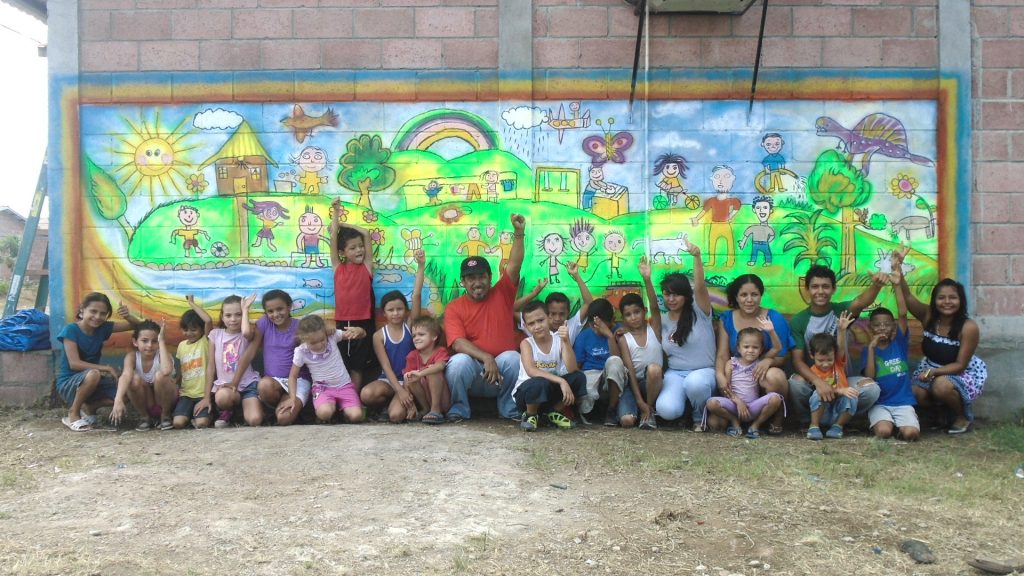Young people are clear that it is necessary to fulfill the right to the city and radically change the way we live in our habitat

Children’s mural in Honduran cooperative Covimarl.
Article by Isabel Pascual
International Youth Day is in contemporary times a day of reflection on the current situation and future of young people. As the UN says: it is “an annual celebration of the role of young women and men as essential partners in change, and an opportunity to raise awareness of challenges and problems facing the world’s youth”.
Global challenges and local struggles
After the last disappointment during the evaluation of the Sustainable Development Goals (SDGs) at the High Level Political Forum (HLPF), with data that showed that we are far from reaching the proposed objectives and that in some cases there are setbacks, civil society collectives are gaining strength to influence the next global milestone focussed on one of the gravest worries for young people: the Conference of the Parties on Climate Change, COP25, to be held in Santiago de Chile next December.
The alarm about the threat that climate change poses to progress in sustainable development was raised again in the HLPF. The UN report warns that the effects of climate change are undermining progress on Agenda 2030 and threatens to reverse many of the achievements of recent decades that have improved people’s lives. We heard this same message in the assessment of its predecessors, the Millennium Development Goals. How long are we to lament without action?
The people who suffer most from the negative impacts of climate change are those who do not enjoy the promised benefit of the global economy, those who are constantly deprived of their rights by a system that not only commodifies lifestyles and commons, but plans their destiny without prioritizing their needs, rights and aspirations. Among the most disadvantaged groups are children and youth. That is why thousands of young people around the world are rising up to demand greater action and justice for all past, present and future victims of the climate crisis.
Right to the City and Climate Change
The Right to the City is a cornerstone in the fight against climate change for two main reasons:
- Because it is the right to the equitable use of cities, their services and opportunities to live in a healthy and sustainable environment.
- Because it implies the right to transform the city into something radically different, in a fair and equitable way, highlighting the social aspect of this production of urban habitat.
This materializes in people’s alternatives to climate change mitigation strategies based on promoting local development and participation in policy formulation in all spheres affecting them, global, national and local, in order to ensure the realization of their right to the city in a human rights habitat. These initiatives range from awareness-raising projects, responsible management of common goods, promotion of sustainable urban-rural links, promotion of renewable energies, adoption of environmentally friendly practices and social production of habitat, among others.
Some inspiring practices can be found in the publication Utopías en Construcción by Habital International Coalition in Latin America (HIC-AL). Such as the Caño Martín Peña community land trust in Puerto Rico, which, through organization and collective ownership, guarantees the social control and health of its territory, as well as preventing the gentrification and displacement of its inhabitants.
An initiative that seeks an ideal that transforms society-nature relations is the Aldeafeliz in Colombia. It is based on permaculture, whose principles are: to take care of the Earth, human beings, and to share resources equitably. Another example is the post-disaster reconstruction of the Montaña de Guerrero, in Malinaltepec, Mexico, whose objective is to rebuild with the knowledge and materials of the peoples, to respect nature and the common goods, to advance towards an integral management of the territory and to reduce the effects of climate change.
Aware of the importance of disseminating good practices and giving a voice to discriminated groups that demand substantial changes, the Global Platform for the Right to the City, together with its member TECHO, is launching a challenge to young people in Latin America on Climate Change under the framework of the Right to the City, so that they can take action on their future and that of the planet within the framework of the Right to the City.
Government representatives should act vigorously against climate change and not take it as an excuse for not meeting their sustainable development commitments. Communities vulnerable to its impacts cannot afford to postpone the fight against its effects and the prospect of an increasingly real and widespread ecological catastrophe. It is clear to young people that radical change is needed to make our common future better. Learning from their voices is fundamental to the realization of the right to the city.
__________________________________________________________________________________________________
Article originally published in Spanish in El País
Isabel Pascual Díaz is communications coordinator for the Global Platform for the Right to the City, a movement composed of civil society organizations, networks and local government organizations committed to social change that promote, defend and fulfill the right to the city, and part of the Habitat International Coalition (HIC) a global network that works to defend, promote and realize habitat-related human rights in both rural and urban areas.




